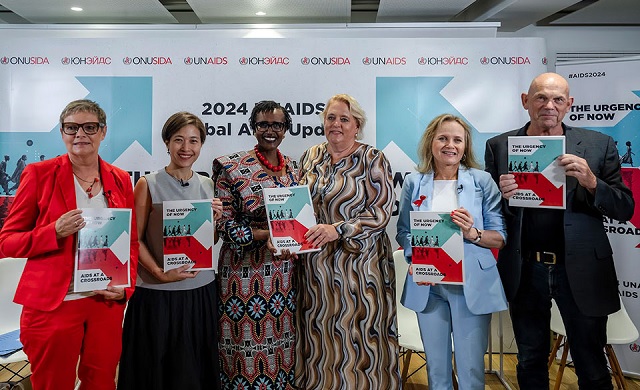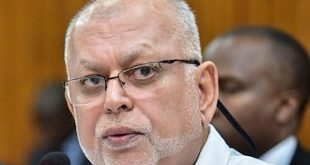
UNAIDS urges leaders to ‘act now’ to ensure human rights for people affected by HIV
ANALYSIS | AGENCIES | At the 25th International AIDS Conference (#AIDS2024), UNAIDS urged all participants to stay committed because the end of AIDS is within grasp.
The Joint United Nations Programme on HIV/AIDS (UNAIDS) called on leaders to embrace new scientific developments to prevent HIV, ensure that the work to end AIDS is fully resourced, and to ‘stand for justice’ to end harmful laws preventing people from accessing lifesaving HIV services.
On the first day of the conference, UNAIDS released a new report, ‘The Urgency of Now: AIDS at a Crossroads’ showing that the decisions taken by world leaders this year will decide the fate of millions of people and determine whether world leaders will meet their commitment to end AIDS as a public health threat by 2030. Data from the report was used to highlight this critical message in sessions and plenaries throughout the conference.
At the opening ceremony, the Executive Director of UNAIDS Winnie Byanyima set a tone of determination and collective action saying, “The path that ends AIDS is well sign-posted, it is proven and it has been promised. Success or failure will be determined by which path leaders take today. Let us continue walking the path of solidarity, together and with urgency.”
A major focus of the conference was on lenacapavir, an injectable medicine taken once every six months which has shown in trials to be 100% effective in preventing HIV. UNAIDS called the new drug a ‘game-changer’ and urged manufacturer Gilead to make it affordable and available as soon as possible to the millions of people who could benefit from it.
“We still have 1.3 million new HIV infections per year. We want this ‘miracle’ prevention drug to reach all those who need it, now – not in 6 years!” said Ms Byanyima. “Gilead needs to move quickly to license lenacapavir to generic producers. Generic producers bring the price down and serve all countries where the majority of people who are at risk live.”
UNAIDS called for equity and human rights, engaging discussions on reducing stigma and discrimination, and ensuring human rights for all people affected by HIV, particularly the most marginalized and the most vulnerable to HIV including women and girls, men who have sex with men, sex workers and people who use drugs.
Echoing this call, the German Chancellor Olaf Scholz said, “What we really have to keep working on is the fight against discrimination and stigma. This applies to each and every individual living with HIV.” He added, “Every single person must be protected – no matter where they come from, no matter how healthy they are, no matter who they love.”
He announced that Germany would be joining the UNAIDS Global Partnership for Action to Eliminate all Forms of HIV-related Stigma and Discrimination and that Germany would ‘continue to be a reliable partner to UNAIDS’.
UNAIDS also highlighted the leadership role communities play in reaching people with HIV services and countries to ensure that community organisations are fully engaged, fully funded and have a seat at the table in all decision-making processes affecting people living with and at risk of HIV.
Across, the conference programme, UNAIDS collaborated with the U.S. President’s Emergency Plan for AIDS Relief (PEPFAR) on the shared priorities in the AIDS response, as they work together to accelerate toward 2030 and sustain the gains beyond.
UNAIDS said it is grateful to PEPFAR’s Ambassador, DR John Nkengasong, for his continued leadership and partnership in the response to HIV.
This year’s conference, which took place in Munich, Germany from 22-26 July 2024, brought together 15 000 global leaders, scientists, advocates, and communities under the theme “Put People First!” to advance progress towards the shared global goal of ending AIDS by 2030.
Winnie Byanyima expressed her gratitude to all participants and reaffirmed UNAIDS’ commitment to ending AIDS. “This conference has been a testament to the power of unity, innovation, and resilience. Together, we have made significant strides, and we leave Munich with renewed energy and determination to achieve our goal of ending AIDS by 2030,” said Ms Byanyima.
UNAIDS leads and inspires the world to achieve its shared vision of zero new HIV infections, zero discrimination and zero AIDS-related deaths. UNAIDS unites the efforts of 11 UN organizations—UNHCR, UNICEF, WFP, UNDP, UNFPA, UNODC, UN Women, ILO, UNESCO, WHO and the World Bank—and works closely with global and national partners towards ending the AIDS epidemic by 2030 as part of the Sustainable Development Goals.
 The Independent Uganda: You get the Truth we Pay the Price
The Independent Uganda: You get the Truth we Pay the Price


